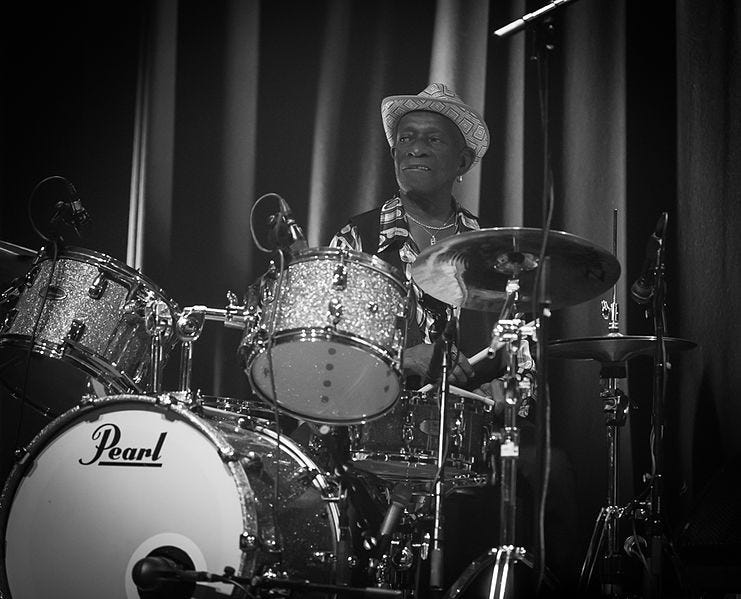Welcome to Just Two Things, which I try to publish daily, five days a week. Some links may also appear on my blog from time to time. Links to the main articles are in cross-heads as well as the story.
#1: Greening the city
The global design company WATG has produced some gifs that imagine the greening of familiar city locations, such as London’s Fleet Street and the area around New York’s Flatiron Building. There’s coverage on the Core 77 design blog.
I can’t pop any of the gifs into here, so a still will have to do.
(Source: WATG)
The gifs are short, but they’re packed with detail, based on WATG’s research into its concept of the ‘Green Block’:
The green measures are meant to serve "as a living, breathing solution to air filtration; reducing car noise, impact and pollution; and increasing green corridors for urban dwellers and visitors to interact with nature. The solution encourages cycling and walking, replacing paved paths with lush native greenery; and enhances curb appeal for restaurants and retail – providing untapped commercial opportunities for increased foot traffic and outdoor dining and shopping."
Each of the gifs is also supported by a longer article that discusses that particular location: for example, there’s more about London here.
One of the tasks of futures work, especially in imagining preferred futures, is to both create desirable images of the future and to make the present feel a little strange. After all, it’s only ‘normal’ that our streets are dominated by cars if you have been brought up in a particular 20th century worldview.
So what I like about WATG’s gifs is that they are visually arresting and only take a moment to unfold a preferred future.
In a similar vein, a reminder of Chatham House’s Piccadilly 2121 project, which I was involved with and for which Platform Group developed the visualisation. It unfolds a some futures for Piccadilly Circus that sit between possible and preferred—the cars go in a few years—if not quite as instantly as the gifs.
#2: Remembering Tony Allen
(Tony Allen in 2015. Photo by Tore Sætre/ Wikipedia)
It’s a year today since the great drummer Tony Allen died at the age of 79, one of the towering figues of African music over the last half century. One of the best tributes to him last year was on the podcast Afropop Worldwide (59 minutes) who took the journey with Michael Veal, an American musician and academic who helped write Allen’s biography. Interviews with collaborators are weaved together with his music.
His closest collaboration over the years was with Fela Kuti, and together they transformed the sound of West African ‘highlife’ music, bringing jazz inflections in to sharpen the sound. But as Fela became more involved in black power politics, and in opposing the Nigerian regime—with brutal consequences for him—Allen started a solo career, initially in Nigeria and later in London and Paris.
Apart from being an extraordinary drummer, part of Allen’s secret was a relentless curiosity and a willingness to play with anyone who seemed interesting—and in any number of styles.
Down the years, this ranged from members of the Parliament Funkadelic crew to the electronic musician Jeff Mills to Damon Albarn, which also working with a host of Africa’s leading musicians—King Sunny Ade, Oumou Sangare, Angelique Kidjo, and Hugh Masakela are all on that list.
Mills met him after Allen, in his 70s, had hired a studio in New York and invited musicians to drop in to chat and see what happened.
His first years in Paris coincided with a downturn in the demand for drummers, as electric drumkits invaded the music industry. But by the early ‘90s producers remembered the benefit of actual drummers and Allen worked constantly for the rest of his life, touring widely.
Drumming is a mystery to me, but I know that musicians understand what a great drummer can do. In the podcast Albarn talks about getting lost in the different rhythms and time patterns that Allen was able to create:
sometimes you got suspended between his high hat and his downbeat. Or anywhere in those three, the high hat the snare and the bass drum. If you got caught somewhere in there, you could get lost, and literally lose your mind, cast out into a parallel universe, waiting for Tony to call you back.
The podcast comes with a transcript, and if you want to hear more of the music it’s worth working through the tracks that are listed in it. (It’s crying out for a playlist!) One of the benefits of recorded music is that you can track the way a musician evolves over time, and you definitely get a sense of that from this programme.
Listening to the podcast, I realised that his career was emblematic of something wider. One of the things that happened in the wake of the independence of African states such as Nigeria during the ‘60s was that African culture grew more influential globally—certainly its musical culture. Some of this was associated with African communities in Europe and elsewhere starting to become more visible during the ‘70s and ‘80s. Music also became more curious. Allen’s character and talents fitted the times he lived in.
j2t#088
If you are enjoying Just Two Things, please do send it on to a friend or colleague.




